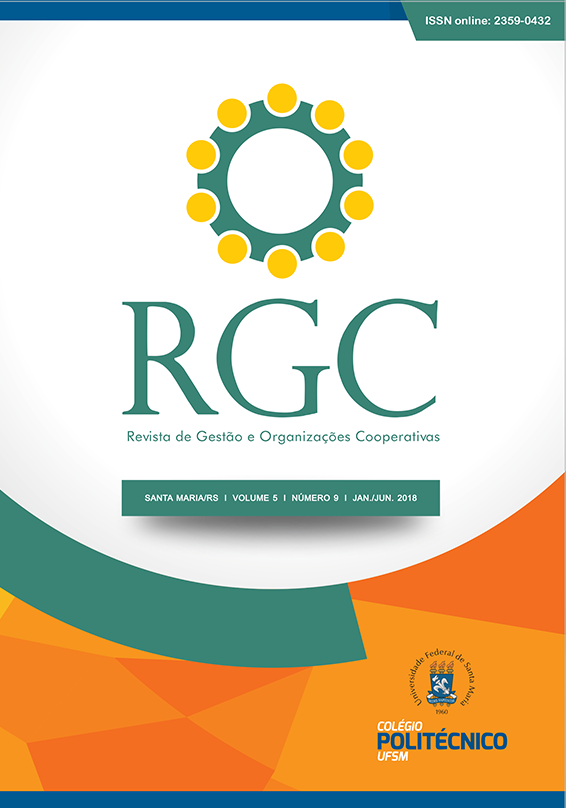The Authenticity Of Brand And The Agroindustrial Cooperatives Of Paraná
DOI:
https://doi.org/10.5902/2359043228743Palabras clave:
Consumer behavior, Brand authenticity, Agroindustrial cooperativesResumen
This study aimed to identify the brand authenticity of cooperatives known in Paraná and its prominent dimensions, based on consumer assessment, with a measure of cognitive and behavioral authenticity proposed by Kososki (2015). Twenty-one brands of agroindustrial food-producing cooperatives were used, linked to the Organization of Cooperatives of Paraná (OCEPAR). The method is characterized as descriptive, with a quantitative and qualitative approach, through the application of 388 questionnaires by Google Forms, from 9000 links randomly distributed between February and March 2016. The results showed the prominent dimensions of the cooperatives surveyed, quality, origin, simplicity and essence. In addition, there was a rise of the tradition dimension in the context of cooperatives, whose size was not used in the final scale of Kososki (2015). It was concluded that cooperatives have a strong influence on the lives of external and internal consumers, in reference to quality products and presence in the daily lives of people, at the regional levelDescargas
Citas
ASSIOURAS, I. et al. The Impact of Brand Authenticity on Brand Attachment in the Food Industry. British Food Journal, v. 117, p. 538-552, 2015.
AZOULAY, A.; KAPFERER, J-N. Do Brand Personality Scales Really Measure Brand Personality?. Brand Management, v. II, n. 2, p.143-155, nov. 2003.
BAUMEISTER, R. F. Yielding to temptation: Self-control failure, impulsive purchasing, and consumer behavior. Journal of Consumer Research, v. 28, n. 4, 2002.
BISHOP, D. Building Brand Authenticity. 7 Habits of Iconic Brands. Journal of Product & Brand Management, v. 20, n. 4, p.327–328, 2011.
BRUHN, M.; et al. Brand Authenticity: Towards a Deeper Understanding of Its Conceptualization and Measurement. Advances in Consumer Research, v. 40, p. 567-576, 2012.
COSTA NETO, P. L. de O. Estatística. São Paulo: Edgard Blucher, 1977.
DAVIS, S. M. Brand Authenticity: It's the Real Thing. Brandweek, v. 43, n. 4, p. 21, 28 jan. 2002.
EDBERG, E.; SIVERTZEN, O. Keeping it Real while Selling Out How to increase Customer-Based Brand Equity by utilizing Brand Authenticity. 2015. 83f. Master’s Thesis, Department of Business Studies, Uppsala University, 2015.
HOLBROOK, M. B. What is consumer research? Journal of Consumer Research (1986-1998). ABI/INFORM, Vol. 14, n. 1, jun. 1987.
HOLT, D. B. How consumers consume: a typology of consumption practices. Journal of Consumer Research – ABI/INFORM, v. 22, n. 1, jun. 1995.
JOHAR, G. V.; MAHESWARAN, J. D.; PERACCHIO, L. A. MAPping the Frontiers: Theoretical Advances in Consumer Research on Memory, Affect, and Persuasion. Journal of Consumer Research, ABI/INFORM, Vol. 33, jun. 2006.
KOLAR, T.; ZABKAR, V. A consumer-based model of authenticity: An oxymoron or the foundation of cultural heritage marketing? Tourism Management, v. 31, p. 652–664, 2010.
KOSOSKI, M. R. Autenticidade de marca: desenvolvimento de uma nova escala a partir da avaliação do consumidor. 2015. 129 f. Dissertação (Mestrado em Administração)- Universidade Federal do Paraná, Curitiba, Paraná, Brasil, 2015.
LARAN, J. A.; ROSSI, C. A. V. Surpresa e a formação da satisfação do consumidor. ERA – eletrônica, v. 5, n. 1, jan./jun. 2006.
LOPES, E. L.; SILVA, D. da. Modelos integrativos do comportamento do consumidor: uma revisão teórica. Revista Brasileira de Marketing, v. 10, n. 3, p. 03-23, 2011.
MORHART, F. et al. Brand authenticity: An integrative framework and measurement scale. Journal of Consumer Psychology, v. 25, n.2, 200–218, 2015.
NAPOLI, J. et al. Measuring consumer-based brand authenticity. Journal of Business Research, v. 67, n. 6, 1090-1098, 2013.
OCEPAR. Cooperativas do Paraná: produtos e serviços com garantia de qualidade. Revista Cooperativas – juntos a gente faz melhor, 2015. Disponível em: < http://www.paranacooperativo.coop.br/ppc/images/Comunicacao/2015/revista/produtos_servicos_reduzido.pdf> acesso em 01 de fev. de 2015.
RAUPP, F. M.; BEUREN, I. M. Metodologia da pesquisa aplicável às ciências sociais. In: BEUREN, I. M. (org). Como elaborar trabalhos monográficos em contabilidade: teoria e prática. 3 ed. São Paulo: Atlas, 2009.
RIBEIRO, L. (Org.). Marketing social e comportamento do consumidor. São Paulo: Pearson Education do Brasil, 2015.
SAMARA, B. S.; MORSCH, M. A. Comportamento do consumidor: conceitos e casos. São Paulo: Prentice Hall, 2005.
SCHALLEHN, M.; BURMANN, C.; RILEY, N. Brand Authenticity: Model Development and Empirical Testing. Journal of Product & Brand Management, v. 23, p. 192-199, 2014.
STREINER, D. L. Being inconsistent about consistency: when coefficient alpha does and doesn´t matter. Journal of Personality Assessment, v. 80, p. 217-222, 2003.
YOO, B.; DONTHU, N. Developing and validating a multidimensional consumer-based brand equity scale. Journal of Business Research, v. 52, p. 1-14, 2001.
ZAICHKOWSKY, J. L. Measuring the Involvement Construct. Journal of Consumer Research, v. 12, p. 341-352, dec., 1985.
Descargas
Publicado
Versiones
- 2022-05-30 (2)
- 2018-08-02 (1)
Cómo citar
Número
Sección
Licencia
Derechos de autor 2018 Revista de Gestão e Organizações Cooperativas

Esta obra está bajo una licencia internacional Creative Commons Atribución-NoComercial-CompartirIgual 4.0.
Autores que publicam nesta revista concordam com os seguintes termos:
- Autores mantém os direitos autorais e concedem à revista o direito de primeira publicação, com o trabalho simultaneamente licenciado sob a Licença Creative Commons Attribution que permite o compartilhamento do trabalho com reconhecimento da autoria e publicação inicial nesta revista.
- Autores têm autorização para assumir contratos adicionais separadamente, para distribuição não-exclusiva da versão do trabalho publicada nesta revista (ex.: publicar em repositório institucional ou como capítulo de livro), com reconhecimento de autoria e publicação inicial nesta revista.
- Autores têm permissão e são estimulados a publicar e distribuir seu trabalho online (ex.: em repositórios institucionais ou na sua página pessoal) a qualquer ponto antes ou durante o processo editorial, já que isso pode gerar alterações produtivas, bem como aumentar o impacto e a citação do trabalho publicado (Veja O Efeito do Acesso Livre).







